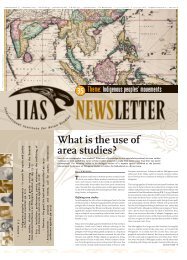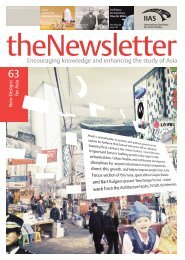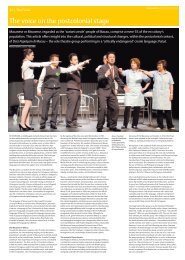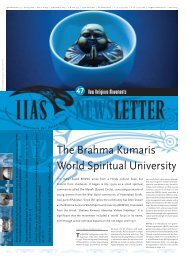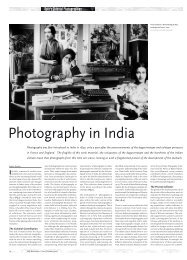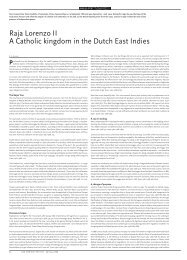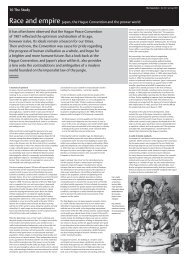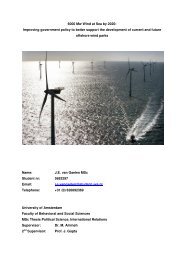Sex, love and revolution - IIAS
Sex, love and revolution - IIAS
Sex, love and revolution - IIAS
Create successful ePaper yourself
Turn your PDF publications into a flip-book with our unique Google optimized e-Paper software.
R E V I E W<br />
Van Dijk, Kees. 2007. The Netherl<strong>and</strong>s Indies <strong>and</strong> the Great War, 1914-1918. Leiden: KITLV Press. xiii + 674 pp., illus.<br />
Dutch resilience:<br />
maintaining a distant colony during world war<br />
Nicholas Tarling<br />
This is a book on a gr<strong>and</strong> scale, the<br />
product of vast industry <strong>and</strong> learning<br />
on the part of an author already well<br />
known as an authority on the Darul Islam<br />
movement <strong>and</strong> on post-Suharto Indonesia,<br />
made available to us by the admirable<br />
Leiden Institute. It is a work of traditional<br />
historiography, informed by an awareness<br />
that, as the late Stephen Gould put it,<br />
‘complex events occur but once in detailed<br />
glory’.<br />
There is no explicit theorising. But it would<br />
after all be difficult to make generalisations<br />
about so exceptional a history as that<br />
of the Netherl<strong>and</strong>s Indies in the 19th <strong>and</strong><br />
early 20th centuries. That history is full of<br />
apparent paradoxes, many of which may,<br />
however, be resolved by recurring to a<br />
central fact: a small European state dominated<br />
a vast, resource-rich <strong>and</strong> populous<br />
archipelago at the other end of the world.<br />
How was that possible?<br />
Here’s how: trade from the<br />
outside, ‘Ethical Policy’ from<br />
the inside<br />
The first answer the Dutch found was to<br />
open the isl<strong>and</strong>s to world trade, securing<br />
a substantial share for themselves, but<br />
allowing others a share, too. That policy,<br />
initially imposed on them by Great Britain,<br />
was extended to other powers from<br />
the 1870s. They would accept the political<br />
dominance of the Dutch if allowed commercial<br />
opportunity.<br />
Within that economic framework the<br />
Dutch found their second answer. They<br />
gradually built up the entity of Netherl<strong>and</strong>s<br />
India, adopting <strong>and</strong> adapting existing<br />
political structures, co-opting traditional<br />
rulers, securing compliance with a minimum<br />
of coercion. The overthrow of their<br />
Spanish neighbours in the Philippines<br />
in the 1890s suggested that this answer<br />
might not be enough. That was one argument<br />
for the Ethical Policy of the early 20th<br />
century: it would win over both elite <strong>and</strong><br />
masses by means that the Spaniards had<br />
notably failed to adopt. Together with the<br />
economic changes induced by world trade,<br />
the policies inaugurated, even before the<br />
first world war, a series of social <strong>and</strong> political<br />
changes that were welcomed by Ethici<br />
but alarmed others. Where was the Indies<br />
heading?<br />
Van Dijk’s earlier chapters, which give a<br />
graphic account of the Indies before the<br />
war, detail some of the differing reactions.<br />
How was the urge to modernity to be reconciled<br />
with the continued concern for<br />
peace <strong>and</strong> order? How were nascent political<br />
movements to be h<strong>and</strong>led? Even more<br />
extraordinary, we read, for example, of the<br />
unionisation of the navy <strong>and</strong> the emergence<br />
of what some called a ‘red fleet’<br />
(page 96).<br />
What was the war’s impact on this extraordinary<br />
state <strong>and</strong> the extraordinary state of<br />
flux it was in? In the second world war, the<br />
Netherl<strong>and</strong>s, of course, lost its neutrality<br />
<strong>and</strong> then lost its empire, <strong>and</strong> the results,<br />
all admit, were decisive for the future of an<br />
independent Indonesia. In the first world<br />
war the Netherl<strong>and</strong>s was not invaded by<br />
Germany, nor was its colony invaded by<br />
the Japanese. But it was a world war, <strong>and</strong><br />
so prolonged <strong>and</strong> catastrophic event could<br />
not have ‘virtually passed the colony by’, to<br />
use van Dijk’s phrase (page vii).<br />
Walking the line: Dutch<br />
aspirations to neutrality<br />
The wish to preserve neutrality was a challenge<br />
to Dutch officialdom. Governor-General<br />
Idenburg appealed to the citizens of the<br />
warring parties whom trade had brought<br />
to the Indies to respect it. Throughout the<br />
war, however, the Germans demonstrated<br />
their national feelings, bearing witness to<br />
their ‘common emotion <strong>and</strong> their devotion<br />
to king <strong>and</strong> fatherl<strong>and</strong>’ (page 176). The<br />
French <strong>and</strong> the Britons were not very different.<br />
More serious was the growing British<br />
belief that the Dutch were in fact doing<br />
too little to ensure that the Indies were not<br />
used as a route for smuggling arms <strong>and</strong><br />
propag<strong>and</strong>a by the German-Indian conspiracy<br />
to overthrow the empire in India.<br />
The Dutch, indeed, felt a certain solidarity<br />
with other colonial powers, <strong>and</strong> were, as<br />
van Dijk suggests, concerned lest unrest<br />
spread to the Indies (page 327), one outcome<br />
being the creation of the PID, the<br />
Political Intelligence Service, in 1916. But,<br />
in the eyes of Walter Beckett, the British<br />
Consul-General in Batavia, they did not do<br />
enough. At one point he suggested to the<br />
Foreign Office in London that the British<br />
should divide the Indies with their allies<br />
the Japanese.<br />
That proposal is one of the few points that<br />
van Dijk might have considered including<br />
in his richly detailed account. He does, of<br />
course, point to the concern the Dutch<br />
felt about the Japanese <strong>and</strong> the interest in<br />
them on the part of some of their subjects,<br />
<strong>and</strong> to their apprehension lest the Anglo-<br />
Japanese alliance undermine their own<br />
fundamental underst<strong>and</strong>ing with the British.<br />
In a sense Beckett’s suggestion, <strong>and</strong><br />
the Foreign Office reaction to it, completes<br />
the story. ‘If the Netherl<strong>and</strong>s Indies are not<br />
too friendly they are harmless. It would be<br />
quite another matter if the isl<strong>and</strong>s were<br />
in the h<strong>and</strong>s of the Japanese’ (Minute by<br />
Langley, n.d. FO 371/2691 [23543131446],<br />
National Archives, London). Given that<br />
view, the Netherl<strong>and</strong>s Indies was unlikely<br />
to be lost in the war, unless Britain lost.<br />
Maintaining participation in world trade,<br />
the other support for the existence of Netherl<strong>and</strong>s<br />
India, was more of a challenge. Initially,<br />
as van Dijk makes clear, the colony<br />
performed better than expected. After the<br />
first two years of war, however, its position<br />
deteriorated, as Britain maintained <strong>and</strong><br />
tightened its control on neutral trade, shipping<br />
became scarce, the Germans resorted<br />
to unrestricted submarine warfare <strong>and</strong><br />
America entered the war. Exports piled up,<br />
imports – even of rice – were restricted<br />
<strong>and</strong> the risk of popular unrest increased.<br />
The continuance of the war also had its<br />
political effects, in part indeed connected<br />
with the deterioration of the economy, in<br />
part also as a result of changes the war<br />
induced elsewhere, particularly in Russia.<br />
Initially, the ‘native movement’ had displayed<br />
its loyalty. Then anxiety about the<br />
defence of the colony had raised the question<br />
of creating a militia, <strong>and</strong> that in turn<br />
raised all sorts of questions. Could the rulers<br />
risk arming their subjects? Should their<br />
subjects join without securing some participation<br />
in ruling the realm they would be<br />
called on to defend?<br />
The fruit of Dutch resilience<br />
The overthrow of Tsardom contributed to<br />
the radicalisation of the nationalist movement<br />
<strong>and</strong> to the division within Sarekat<br />
Islam between the left <strong>and</strong> the right that<br />
was to culminate in the creation of the<br />
Communist Party in 1920. The government,<br />
perhaps still influenced by the Ethical<br />
ideology, perhaps also wanting to avoid<br />
provocation, was slow to react. News – <strong>and</strong><br />
lack of news – from the Netherl<strong>and</strong>s at the<br />
end of the war seems to have prompted<br />
Governor-General van Limburg Stirum to<br />
offer additional concessions to the newlyfounded<br />
Volksraad, though ultimately little<br />
or nothing came of them, <strong>and</strong> no militia<br />
was ever created. That does not perhaps<br />
mean that the war was without effect. The<br />
radicalisation it had advanced <strong>and</strong> the<br />
Governor-General’s response prompted<br />
the reaction of the 1920s against what<br />
remained of the Ethical Policy.<br />
It is, of course, as van Dijk concludes (page<br />
630), the Indonesians in this story whom<br />
Indonesians now remember, <strong>and</strong> he has<br />
brought those rather sympathetic figures<br />
alive. He has also restored to the historiography<br />
some of the Dutchmen who both<br />
ruled <strong>and</strong> argued over the Indies <strong>and</strong> had<br />
a role in creating <strong>and</strong> preserving the realm<br />
that the Indonesians inherited.<br />
War created economic challenges, but<br />
also offered economic opportunities. New<br />
trade routes <strong>and</strong> new markets were found,<br />
<strong>and</strong> some import-substitution industries<br />
were established. Some Dutchmen spoke<br />
of ‘resilience’, a word the Suharto regime<br />
was later to deploy. A prominent Dutch<br />
businessman, C. J. K. van Aalst, took the<br />
initiative in establishing a technical college<br />
in the colony. Among its first students<br />
when it opened in 1920 was a young man<br />
no one will ever forget, the first President,<br />
Sukarno.<br />
Nicholas Tarling is a Fellow at the University<br />
of Auckl<strong>and</strong>’s New Zeal<strong>and</strong> Asia Institute.<br />
n.tarling@auckl<strong>and</strong>.ac.nz<br />
[ a d v e r t i s e m e n t ]<br />
3 2 I I A S N E W S L E T T E R # 4 8 S u m m e r 2 0 0 8



